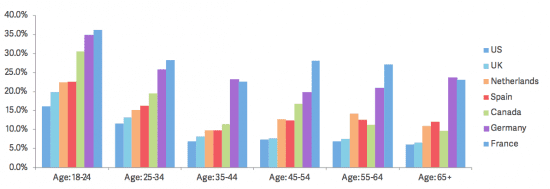We talked to Lee Evans about how he sees ad-blocking affecting digital marketers
It's hardly surprising that digital marketers are no fans of ad-blockers. For many online publishers who make their revenue that way, it can feel like people are basically making off with their content without contributing to their revenue. As you'll know Ad blocking is on the rise as these latest stats on the popularity of ad blockers show. It's an imporant issues since in some countries, in younger age groups over one third of audiences used ad blockers.

For digital marketers who work it other areas like ecommerce or marketing a SaaS product, the problem is more around missing out on large segments of their potential audience when they run ad campaigns online.
 But marketers need not despair, there are ways to circumvent ad-blockers, and some of the more optimistic in the marketing community think ad-blockers could help galvanise the industry into marking better ads that resonate better with their audiences. According to these 'ad-blocker optimists', ad-blockers will punish lazy marketers who's ads are intrusive and annoying, but will reward those that have bothered to craft great copy that's delivered to customers at the exact second their interested in seeing it.
But marketers need not despair, there are ways to circumvent ad-blockers, and some of the more optimistic in the marketing community think ad-blockers could help galvanise the industry into marking better ads that resonate better with their audiences. According to these 'ad-blocker optimists', ad-blockers will punish lazy marketers who's ads are intrusive and annoying, but will reward those that have bothered to craft great copy that's delivered to customers at the exact second their interested in seeing it.
Someone who would definitely identify with the 'ad-blocker optimists' school of thought is Lee Evans, the CEO of SurveyMe. He views the changes ad-blockers are driving as one of the most revolutionary shifts in customer engagement to date, dramatically transferring the power back into the hands of the consumer. Lee and his team have spent the past years helping companies in more than 130 countries tap into their customers experience, and over that time he's been watching how ad-blocking technology has been affecting marketers and customers alike. 
I asked Lee about how he saw ad-blockers affecting marketers and what they could do to still get great results from their campaigns.
Q. First things first, be honest, do you use an ad blocker?
Yes.
Q. If you could wave a magic wand and ban all ad blockers overnight, would you do it?
No, as they serve a purpose
Q. Do you think the high usage rates of ad blockers say something about the digital marketing industry?
Yes. They are a direct and effective response to spray and pray marketing.
Q. Ad blocking varies considerably between countries. Do you think we’ll see convergence in rates between countries or are underlying factors causing these differences?
I think is a question of how developed and frequent marketing ads are. Ad blockers become very useful when the user feels saturated with ads for things that are irrelevant or distracting.
Q. Ad blockers came to mobile in a big way last year. What impact has this had for publishers, and are there any ways they can reduce the negatives from this?
The point of advertising ultimately is to get people to buy more and buy more frequently. Engaging people at the point of experience (eg when they are consuming and thinking about that product) is likely to be far more effective. Mobile is perfect for point of experience rewards.
Q. Do you think ad blockers represent an existential threat to the online publishing industry, or do you think revenue models will be able to adjust and ad blockers circumvented.
Ad blockers only exist to solve and existing pain. Like a virus mutating, the ad blockers and the antidotes will mutate too.
Q. We are starting to see media outlets (e.g 4OD) withholding content from people using ad-blocking software. Do you think this is the right way to go about combatting ad blockers?
No; the right way to go is to engage with people on their mobile devices at the point of consumption with only relevant content.
Q. Do you think ad blockers will increasingly work with sites to allow non-obtrusive ads, or will consumers always opt for the solution that blocks all ads?
Consumers will always be open to seeing relevant, real-time content. Obtrusive ads are lazy adverts. Technology already exists to deliver automated content people will want to see.
Q. How do you see the future of the online advertising industry playing out? Will ad blockers reduce the effectiveness of ads or just mean marketers have to up their game and get smart?
Technology already exists to give relevant content. Gameification of ads will lead to a rise in engagement. For example, asking people to give feedback about an advert in return for a marketing coupon will spark some interest and involvement in the product.
Q. What are your top tips for getting around the problems caused by ad blocking and re-engaging with customers?
Use mobile apps that engage customers and the point of experience and reward them with instantly usable marketing coupons.
Q. Ad blocking has gone from barely heard of to extremely common within the last 5-6 years. What do you see happening with ad-blocking in the next five years?
Becoming increasingly sophisticated until the advertising industry learns that spray and pray marketing on mobile isn’t effective.
Do you agree with Lee? Or think his optimism that ad-blockers can be a good thing for the industry is misplaced? Let us know your thoughts on Adblocking by commenting.









